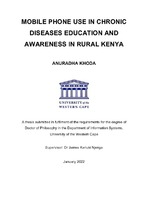Mobile phone use in chronic diseases education and awareness in rural Kenya
Abstract
This study set out to develop an integrated model that could explain the
sustainable adoption of mHealth, among the rural populations.
With a penetration level of 130%, the ubiquitous mobile phone infrastructure
was conducive to implementing mHealth even in the remote and rural regions
of Kenya, which otherwise grapple with inequality and inequity of the
healthcare system and a rising chronic diseases burden. Whereas mHealth
could provide a suitable low-cost solution to disseminate targeted education
to the grass-root masses in a short time, its uptake was reported to be low
and short- lived. Therefore, the purpose of the study was to evaluate the
factors that could explain the low levels of mHealth adoption for education on
chronic diseases in the rural settings of the country.
From a theoretical perspective, a combination of four social behaviour change
theories, three technology adoption models, and two health behaviour change
models guided the development of the theoretical framework. Seven factors
were subsequently tested: perceived susceptibility, perceived severity,
perceived usefulness, perceived ease of use, social influence, age, and
language literacy, all of which measured mobile phone use for health literacy.
Thirteen hypotheses were formulated from these factors.

